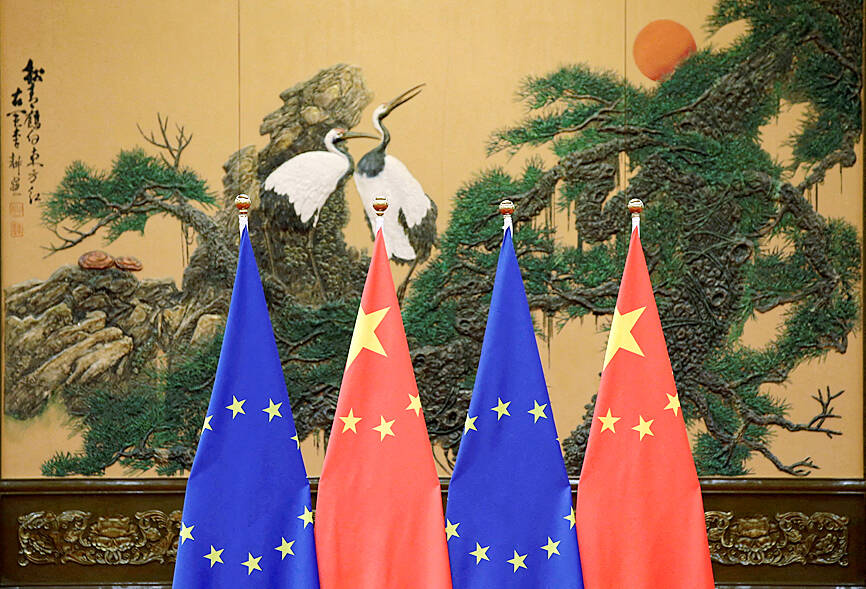The EU is cracking down on Chinese biodiesel imports after investigating complaints that a flood of unfairly priced renewable fuel is undercutting producers in the bloc and hurting workers.
The EU has already set provisional duties for electric vehicles made in China over what it sees as unfair subsidies in its most high-profile case.
The European Commission would impose provisional anti-dumping duties on Chinese imports of biofuels in four weeks, ranging from 12.8 percent to 36.4 percent, the European Biodiesel Board (EBB) said in a statement, citing a document from regulators.

Photo: REUTERS
“Our European businesses have been suffering for far too long under the pressure of unfairly priced Chinese imports and we are very happy to see the European Commission take action,” EBB president Dickon Posnett said.
The finding comes as EU fuel producers worry about being undermined by companies in Asia that are possibly mixing fuels with cheaper ingredients and then mislabeling them to qualify for incentives outlined by the 27-nation bloc’s renewable energy targets.
Chinese companies exported 1.8 million tonnes of biodiesel to the EU last year, 90 percent of all Chinese biodiesel exports, the EBB said.
Similar concerns have taken hold in the US, where business groups are urging US President Joe Biden’s administration to boost levies on Chinese used cooking oil used to make low-carbon fuels.
The duties would be positive for EU producers, although the region has built up an ample supply of biodiesel that any immediate impacts could be muted, Bloomberg Intelligence analyst Brett Gibbs said.
The EBB, which represents European biodiesel producers and filed its complaint over Chinese biodiesel last year, said on Friday that it is “gravely concerned” that the EU did not include Chinese sustainable aviation fuel in the anti-dumping measures. The group said it would address the matter with regulators as a top priority.

SEEKING CLARITY: Washington should not adopt measures that create uncertainties for ‘existing semiconductor investments,’ TSMC said referring to its US$165 billion in the US Taiwan Semiconductor Manufacturing Co (TSMC, 台積電) told the US that any future tariffs on Taiwanese semiconductors could reduce demand for chips and derail its pledge to increase its investment in Arizona. “New import restrictions could jeopardize current US leadership in the competitive technology industry and create uncertainties for many committed semiconductor capital projects in the US, including TSMC Arizona’s significant investment plan in Phoenix,” the chipmaker wrote in a letter to the US Department of Commerce. TSMC issued the warning in response to a solicitation for comments by the department on a possible tariff on semiconductor imports by US President Donald Trump’s

‘FAILED EXPORT CONTROLS’: Jensen Huang said that Washington should maximize the speed of AI diffusion, because not doing so would give competitors an advantage Nvidia Corp cofounder and chief executive officer Jensen Huang (黃仁勳) yesterday criticized the US government’s restrictions on exports of artificial intelligence (AI) chips to China, saying that the policy was a failure and would only spur China to accelerate AI development. The export controls gave China the spirit, motivation and government support to accelerate AI development, Huang told reporters at the Computex trade show in Taipei. The competition in China is already intense, given its strong software capabilities, extensive technology ecosystems and work efficiency, he said. “All in all, the export controls were a failure. The facts would suggest it,” he said. “The US

The government has launched a three-pronged strategy to attract local and international talent, aiming to position Taiwan as a new global hub following Nvidia Corp’s announcement that it has chosen Taipei as the site of its Taiwan headquarters. Nvidia cofounder and CEO Jensen Huang (黃仁勳) on Monday last week announced during his keynote speech at the Computex trade show in Taipei that the Nvidia Constellation, the company’s planned Taiwan headquarters, would be located in the Beitou-Shilin Technology Park (北投士林科技園區) in Taipei. Huang’s decision to establish a base in Taiwan is “primarily due to Taiwan’s talent pool and its strength in the semiconductor

French President Emmanuel Macron has expressed gratitude to Hon Hai Precision Industry Co (鴻海精密) for its plan to invest approximately 250 million euros (US$278 million) in a joint venture in France focused on the semiconductor and space industries. On his official X account on Tuesday, Macron thanked Hon Hai, also known globally as Foxconn Technology Group (富士康科技集團), for its investment projects announced at Choose France, a flagship economic summit held on Monday to attract foreign investment. In the post, Macron included a GIF displaying the national flag of the Republic of China (Taiwan), as he did for other foreign investors, including China-based